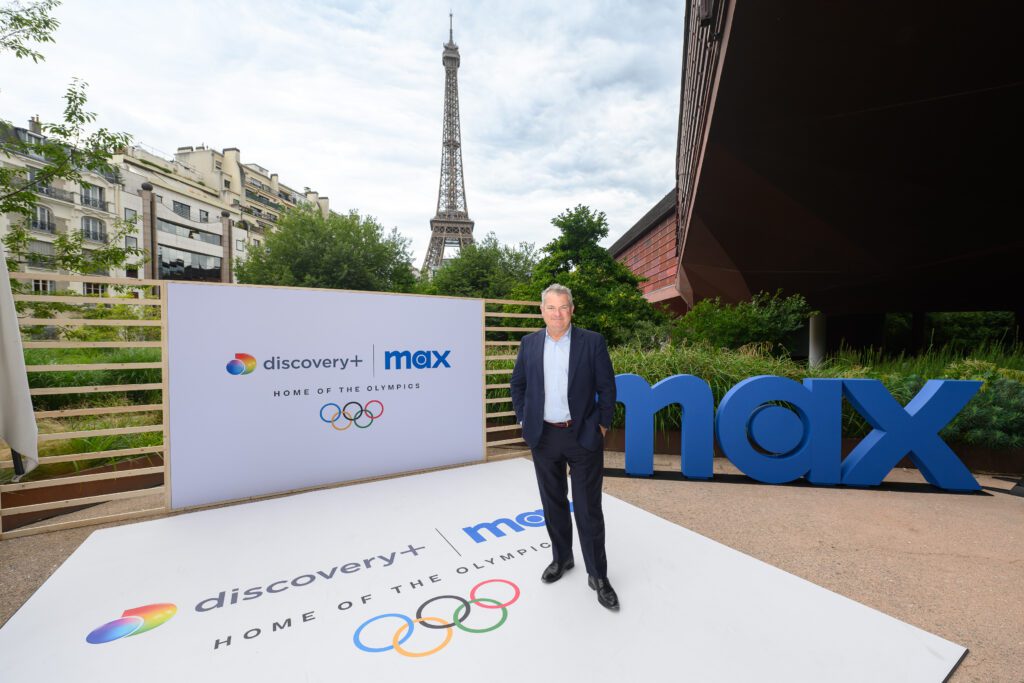This is a hugely significant summer for US media giant Warner Bros. Discovery (WBD), which is rolling out its global streaming platform Max while simultaneously gearing up for extensive live coverage of the 2024 Summer Olympics in Europe.
With today’s opening ceremony of the Paris-hosted event (July 26), MIP Blog caught up with Scott Young, WBD group senior vice president, content, production and business operations for WBD Sports Europe. Young discussed the critical role that premium sport will play in the Max streaming proposition – and offered some insights into how WBD and its flagship sports platform Eurosport are going to help customers navigate their way around thousands of hours of live Olympic action.

MIP Blog: Before we dive into the Paris 2024 Summer Olympics, it’s worth noting that WBD and Eurosport have a huge array of sports rights in areas like cycling, winter sports & tennis. How does all of this sports inventory fit into the new Max proposition?
Scott Young: Max is one of the most significant launches in this company’s history. And we knew from the outset that we were going to create a global streaming product that would put the very best of our entertainment content alongside the very best sport and news coverage. Streaming is clearly the future of accessing content, so we need to make sure our best sport rights surface on the Max platform. We want our customers to have the opportunity to watch their favourite TV show then head to a top sporting event or the latest news without having to use multiple platforms to do that.
Where does live sport sit within the Max ecosystem?
With the exception of Paris 2024, which I’ll return to shortly, all our premium sport will sit in a dedicated sports tier that consumers can add on to other Max tiers. The sports add-on is where fans go to find the Tour de France or the Roland Garros French Open, for example. The Paris Olympics is the exception because that will be part of the basic entertainment tier. We want to make sure that one of the first things customers see when they arrive on Max in a couple of weeks is the Paris Olympics.
You’re placing a lot of emphasis on Max, but you still have sports channels like Eurosport and TNT Sports in the UK. How do they fit into the WBD strategy?
There is a strong trend towards streaming, but it’s too early to walk away from linear TV. So Eurosport (which also has a streaming dimension) and TNT Sports are important ways of delivering sport. It’s important to have a foot in both camps.
Looking more closely at Paris 2024, why have you put your coverage of the event in the general entertainment tier rather than the sports ‘add on’?
It’s about access. We want as many fans as possible to be able to access the Olympic Games. At the same time, Max is a very new offering to audiences. So there can be no barriers to entry. We want people to be able to go straight to the navigation tabs and find the Olympic Games. The customer journey needs to be as seamless as possible, particularly as we’re surfacing every moment of the games.
Presumably you also view Paris 2024 as a way to win new subscribers.
Absolutely. The Olympic Games will be an extraordinary magnet, and we know the audience will be very excited about it. For us, it’s important that we get the message over through our marketing that this is more than just a series of channels covering the Olympics. The games are too big and too diverse to cover in a traditional way. So what we’re saying to consumers is that we’re giving them the power to curate the Olympics. Instead of waiting for us to determine what’s going to go on a linear channel, we’re going to make it possible for fans to watch what they want, when they want, where they want. Once people understand this, it will be a powerful moment.
At that same time, of course, we’re also going to introduce everybody to the fact that Max is not just a sports platform, but the very best entertainment that Warner Brothers Discovery has to offer. The Olympic Games will be a fantastic entry point.
Paris 2024 is part of a rights deal WBD did with the IOC, which granted the company TV and multi-platform broadcast rights for the period 2018–2024. And WBD has already secured the rights for the 2026-2032 Games in partnership with the European Broadcasting Union (EBU). Have you factored-in the possibility that audiences will change in the coming years?
It’s going to be a long time before the Olympics starts to lose its appeal. But I’m well aware of the need for us all to keep connecting with new audiences. That’s why it’s good to see the innovations like the Urban Park at the Place De La Concorde, which will host events like basketball 3×3 and BMX. All the new sports coming through will sit well alongside traditional sports like athletics, swimming and boxing. As we head towards Brisbane 2030, the mind boggles as to how people will be consuming live sport but I’m very positive that the Olympic Games will still be very relevant.
So let’s look at the mechanics of the event. You’ve mentioned the importance of navigation. So how will people consume 3800 hours of content?
We’ve spent an enormous amount of time with experts in streaming navigation to make sure we’ve got the best roadmap possible, so that we can move people around easily. Ultimately our subscribers will tell us about their experience – but we’ve taken great care about how we surface the live rails and the great tentpole moments, including launching Paris 2024 as a hero brand within the navigation bars on Max and other innovations including making the full gamestime schedule available on the platform, all sports and single sport pages, the ability for users to add specific events to ‘My List’ and gold media alerts on web and mobile when a gold medal is about to be won. It’s worth noting that the experience will be very different in different parts of Europe, because we’ll be surfacing sports that have local appeal in individual markets.

Live event coverage is provided by the centralised production division – Olympic Broadcasting Services. How do you support that on the ground?
We work hand-in-glove with OBS. They cover the competitions, and we don’t see a need to enhance their excellent production. Our job is to tell the stories of the 10,500 athletes who will be descending on Paris. Our production team, which is 3000 strong, has been assembled to celebrate what the Olympic Games is all about.
How does that work in practice?
Our model really came to life during the Beijing Winter Games (2022). And that was to ensure we were we were totally immersed in the event. We made sure we had reporters and producers in every venue for every moment of the Games. That allowed us to bring the content to life across all of our different platforms.
So social platforms play a key role in the content mix?
Yes, social media platforms are a really important megaphone for us, because it means the Olympics never sleeps. It’s a 24/7 experience where the story never stops. In Paris, we will not just be focusing on the live content, but the behind the scenes action. We have 98 Olympians as part of our production team which really helps us get behind the curtain. That kind of connection really resonates on social media. We also have some fantastic commercial agreements in place, for example with YouTube content creators – so we have a different optics on what the games look like. We’ve also done a deal that will see daily highlights on Snapchat throughout the games.
Does the job of storytelling start at the opening ceremony or before?
Coverage of the Olympics can’t just be about the Games themselves, it has to start much earlier. The story started for us with a year to go when we launched a documentary series that looked at the period from the last Summer Games in Paris in 1924. And we’ve launched a number of series since then including the Eurosport-produced documentary 4 August – An Olympic Odyssey, which premiered on July 3 and analyses the monumental moments occurring on this date throughout history.
Is there any sense in which AI is relevant to you at Paris 2024
AI already plays a role in many parts of the technologies that we use, for instance in creating fast turnaround content. But I think we’re an Olympic Games too soon before the kind of gen AI we’ve been discussing in the last year or so plays a noticeable role.
After a couple of editions of the Olympics in Asia, how do you feel about the fact it is back in Europe – and in an iconic venue like Paris?
Being in Paris is a game changer. Firstly, because of the time-zone, which means our audience doesn’t have to wake up at two o’clock in the morning to watch events. But for our company it’s also exciting to be in the cultural backyard of Eurosport, where the channel started 35 years ago. We’ve already talked about the significance of Paris 2024 to Max, and I also think now is the right time to hold something of scale, like the Olympic Games in Europe. It’s very meaningful, far beyond just being a sporting event.
To learn more about platform strategies and meet with the leading TV industry executives, join us at MIPCOM Cannes, 21-24 October 2024 in Cannes, France.




